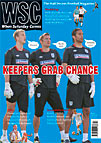 Damian Hall takes a look at the decline of former England goalkeeper Richard Wright
Damian Hall takes a look at the decline of former England goalkeeper Richard Wright
Ten years ago he was playing for England, but at just 32 Richard Wright is without a club. Arsène Wenger may act like he’s lost his credit card nowadays but back in the summer of 2001 he was swiping it about like a madman. Arsenal purchased Giovanni van Bronckhorst, Francis Jeffers, Richard Wright and Junichi Inamoto for around £26 million. Fast forward nine years and most of those players’ careers have taken fairly predictable paths, especially the injury-prone Jeffers. But not Richard Wright’s.
The Ipswich-born goalkeeper made his debut for his local club at 17 and was soon first choice as the club challenged regularly for a place in the top flight. He saved a penalty in the Division One play-off final victory over Barnsley in 1999-2000 and crowned an outstanding season with an England cap, having never played in the Premier League.
In a friendly against Malta he conceded two penalties but saved one as England won 2–1. He was included in the Euro 2000 squad, as third choice behind David Seaman and Nigel Martyn. Both were well into their 30s, yet both would frustrate Wright at club level too.
Wright was soon Seaman’s heir apparent for England, and Arsenal. After a year of Premier League football with Ipswich he moved to north London for £6m. Former manager George Burley made the standard well-wishing noises but was unusually critical. “If Richard is not playing first-team football it will interfere with his development as a player,” he said. “Hopefully he can get in the first team at Arsenal and win 50 caps for England – but I still feel it was a bit of a gamble for him.” Burley also talked of Wright’s “impetuous” personality, but his comments sounded like sour grapes at the time.
Wright began the season on the bench, but the 37-year-old Seaman was soon injured and the new signing got his chance. The left-handed and left-footed keeper looked impressively agile – almost alarmingly so – compared to the more laid-back Seaman. He saved a game-turning penalty in his first Champions League game, against Panathinaikos.
Arsenal fans were pleased to resurrect the popular “Wright, Wright, Wright” chant – only semi-ironically – swapping “Ian” for “Richard”. But the volume gradually decreased. Wright showed he could be erratic, punching the ball into his own net in a freak 4-2 home defeat to Charlton. Seaman retained his place when fit. Wenger made Wright his “FA Cup keeper”, only to cruelly drop him when the Gunners reached the final. Despite injuries, he made 22 appearances but after just one season gave up trying to dislodge Seaman and joined Everton.
At Goodison Wright started as first choice, but a series of injuries pushed him behind Nigel Martyn – enjoying an Indian summer – in the pecking order. When called upon for an FA Cup game against Chelsea in 2005-06 Wright promptly injured himself before kick-off. He managed to fall onto a large sign asking players not to warm up in the goalmouth, injuring his ankle. (He had previously crocked himself falling from his loft.) When Martyn retired, David Moyes bought Tim Howard and released Wright after five years at the club.
Nevertheless, there was still high-level interest in the keeper. West Ham signed him, but then loaned him to Southampton with mysterious speed and in July 2007 he was back where he started, at Ipswich. At last Wright was settled and valued. He was voted Players’ and Supporters’ Player of the Year for 2008-09. But last season the familiar pattern continued. Wright got injured, found himself on the bench again and was then released, relatively high wages not helping his cause.
Aside from his two spells at Ipswich, Wright has averaged just 11 league games a season over seven years – he’s seen more time on benches and treatment tables than the pitch. He is still only 32 – peak age for a keeper – but at the time of writing yet to find another club. Some might say that Wenger was at fault for destroying his confidence and stunting his development, as had happened with Alex Manninger previously. Wright may simply have taken too many wrong turns or been the subject of unjustified early hype.
It’s probably a bit of all three. Nevertheless, Richard Wright may well watch this summer’s World Cup trying to overlook the fact that ten years ago many (himself included, presumably) thought he would be playing in it.
From WSC 281 July 2010